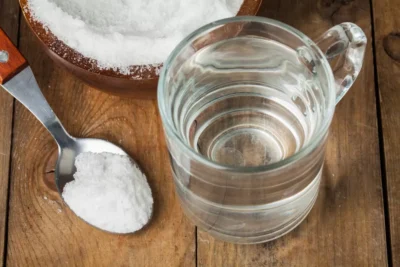A gallon of salt water is a measure of volume. It refers to the amount of space that the salt water occupies. The weight of a gallon of salt water can vary depending on the concentration of salt in the water and the temperature at which it is measured. We will get to know how much does a gallon of salt water weigh on this page.
Typically, a gallon of salt water weighs around 8.34 pounds, but this can vary slightly. Saltwater is denser than freshwater, so a gallon of saltwater will weigh more than a gallon of fresh water. Also, the weight can vary slightly depending on the concentration of salt in the water and the temperature at which it is measured.
Knowing the weight of a gallon of salt water can be important in a variety of contexts. For example, if you are measuring out a specific amount of saltwater for a recipe or scientific experiment, it is important to know the weight of the saltwater in order to ensure that you are using the correct amount.
Additionally, if you are shipping or transporting saltwater, knowing its weight can be important for determining the cost and logistics of the shipment. Furthermore, knowing the weight of a gallon of saltwater can be useful for calculating the weight of other volumes of saltwater, such as a quart or a liter.
How much does a gallon of salt water weigh?

The weight of a gallon of salt water is 8.34 pounds, but it can vary slightly depending on the concentration of salt in the water and the temperature at which it is measured. In general, however, a gallon of salt water will weigh more than a gallon of fresh water due to the increased density of saltwater.
Also the gallon weight of salt water can also be affected by other factors, such as the type of salt used and the presence of any other substances dissolved in the water.
In addition to these variables, the weight of a gallon of saltwater can be affected by the amount of air dissolved in the water, as well as the pressure and temperature at which the water is measured.
How much does one gallon of ocean water weigh?
One gallon of ocean water weighs about 8.34 pounds. This is because the density of seawater is about 1.025 grams per milliliter, which is equivalent to about 8.34 pounds per gallon. Keep in mind that the weight of seawater can vary slightly due to factors such as salinity and temperature.
Is salt water heavier than regular water?
Yes, salt water is generally heavier than regular water. This is because the salt molecules in saltwater are denser than the molecules of pure water, which makes the water heavier. The increased density of saltwater is what causes it to sink to the bottom of a container when it is mixed with freshwater.
The weight of saltwater can vary depending on the concentration of salt in the water and the temperature at which it is measured, but in general, a gallon of saltwater will weigh more than a gallon of fresh water.
Salt water weight vs freshwater
Saltwater is generally denser than freshwater due to the increased weight of the salt molecules in the water. The increased density of saltwater is what causes it to sink to the bottom of a container when it is mixed with freshwater.
The weight of a given volume of saltwater can vary depending on the concentration of salt in the water and the temperature at which it is measured. For example, a gallon of saltwater with a high concentration of salt will weigh more than a gallon of saltwater with a low concentration of salt.
Additionally, the weight of a gallon of saltwater can be affected by other factors, such as the type of salt used and the presence of any other dissolved substances.
[table id=1 /]
As you can see from the table, there are several differences between saltwater and freshwater, including their density, weight, boiling and freezing points, conductivity, taste, and uses. These differences can be important in a variety of contexts, such as in cooking, industry, agriculture, and aquatic environments.
Can salt water become fresh?

Saltwater can be converted into freshwater through a process called desalination. This process involves removing the salt and other minerals from the water, leaving behind pure water that is safe to drink. Desalination can be achieved through a variety of methods, including reverse osmosis, distillation, and electrodialysis.
While these methods are effective at removing salt from water, they can be costly and energy-intensive, which limits their widespread use. As such, desalination is typically only used in areas where there is a lack of freshwater or when other sources of freshwater are not readily available.
Here are some general steps for converting saltwater into freshwater through the process of desalination:
1. Collect the salt water that you want to desalinate. This can be done by using a container to collect seawater from the ocean or by using water that has a high concentration of salt.
2. Pre-treat the salt water to remove any large particles or contaminants that may clog the desalination system or affect the quality of the resulting freshwater. This can be done through various methods, such as filtration or sedimentation.
3. Pass the pre-treated saltwater through a desalination system. There are several different types of desalination systems, such as reverse osmosis, distillation, and electrodialysis. Each of these systems uses different techniques to remove the salt and other minerals from the water, leaving behind pure freshwater.
4. Monitor the quality of the freshwater produced by the desalination system to ensure that it meets the required standards for drinking water. This can be done through various methods, such as testing the water for chemical contaminants, bacteria, and other impurities.
5. Store the fresh water in a clean and safe container for use or distribution. It is important to properly sanitize the container before use to prevent the growth of bacteria and other contaminants.
Overall, the process of desalination is complex and involves several steps to ensure that the resulting freshwater is safe to drink. While it is possible to convert saltwater into freshwater through desalination, the process can be costly and energy-intensive, which limits its widespread use.
Recommended::
Why is the ocean water salty?
The ocean is salty because it contains a high concentration of dissolved salts, such as sodium and chloride. These salts enter the ocean from various sources, such as rivers, streams, and underground aquifers, which carry the minerals from the land and deposit them into the ocean.
Additionally, the ocean is home to a variety of marine life, such as fish and crustaceans, which release salts and other minerals into the water through their metabolic processes. Over time, the concentration of dissolved salts in the ocean has increased, making the water increasingly salty.
The salinity of the ocean can vary depending on a number of factors, such as the location, depth, and temperature of the water. In general, however, the ocean is much saltier than freshwater, with an average salinity of around 3.5%.
Is saltwater good for consumption?
Saltwater is not good for drinking, as it contains high levels of salt that can be harmful to the body. Fresh water is the best option for drinking and hydration.
If you find yourself in a situation where fresh water is not available, it is best to try to find an alternative source or to purify the salt water before drinking it. There are several ways to purify water, including boiling, filtration, and chemical treatment. It is important to be cautious and prepared when it comes to drinking water in any situation.
Conclusion
If you want to know how much does a gallon of salt water weigh for any reason, then you have this post to get all the information you need.
It is not necessarily important to know the weight of a gallon of salt water, but it can be useful in certain situations. For example, if you are trying to calculate the weight of a certain volume of salt water, knowing the weight of a gallon can help you to determine the weight of the desired amount.
Additionally, knowing the weight of a gallon of salt water can be helpful in determining the weight of other substances that are dissolved in water, such as chemicals or pollutants. This information can be useful in a variety of fields, including science, engineering, and environmental studies.

